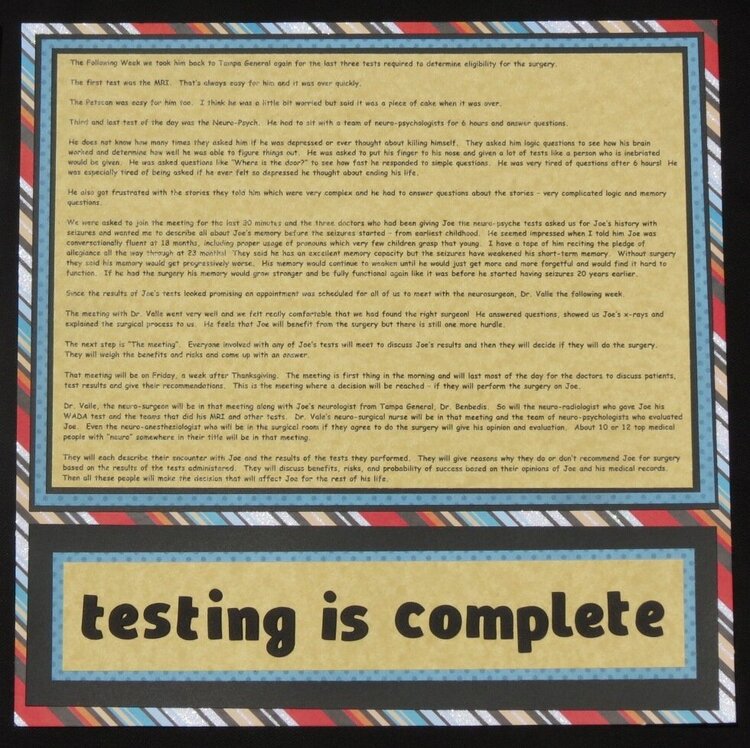Plus, a FREE Gift! | Details Here.


 Give a Cheer
Give a Cheer
Continued from Left Side
The Following Week we took him back to Tampa General again for the last three tests required to determine eligibility for the surgery.
The first test was the MRI. That's always easy for him and it was over quickly.
The Petscan was easy for him too. I think he was a little bit worried but said it was a piece of cake when it was over.
Third and last test of the day was the Neuro-Psych. He had to sit with a team of neuro-psychologists for 6 hours and answer questions.
He does not know how many times they asked him if he was depressed or ever thought about killing himself. They asked him logic questions to see how his brain worked and determine how well he was able to figure things out. He was asked to put his finger to his nose and given a lot of tests like a person who is inebriated would be given. He was asked questions like “Where is the door?” to see how fast he responded to simple questions. He was very tired of questions after 6 hours! He was especially tired of being asked if he ever felt so depressed he thought about ending his life.
He also got frustrated with the stories they told him which were very complex and he had to answer questions about the stories – very complicated logic and memory questions.
We were asked to join the meeting for the last 30 minutes and the three doctors who had been giving Joe the neuro-psyche tests asked us for Joe's history with seizures and wanted me to describe all about Joe's memory before the seizures started – from earliest childhood. He seemed impressed when I told him Joe was conversationally fluent at 18 months, including proper usage of pronouns which very few children grasp that young. I have a tape of him reciting the pledge of allegiance all the way through at 23 months! They said he has an excellent memory capacity but the seizures have weakened his short-term memory. Without surgery they said his memory would get progressively worse. His memory would continue to weaken until he would just get more and more forgetful and would find it hard to function. If he had the surgery his memory would grow stronger and be fully functional again like it was before he started having seizures 20 years earlier.
Since the results of Joe's tests looked promising an appointment was scheduled for all of us to meet with the neurosurgeon, Dr. Valle the following week.
The meeting with Dr. Valle went very well and we felt really comfortable that we had found the right surgeon! He answered questions, showed us Joe's x-rays and explained the surgical process to us. He feels that Joe will benefit from the surgery but there is still one more hurdle.
The next step is “The meeting”. Everyone involved with any of Joe's tests will meet to discuss Joe's results and then they will decide if they will do the surgery. They will weigh the benefits and risks and come up with an answer.
That meeting will be on Friday, a week after Thanksgiving. The meeting is first thing in the morning and will last most of the day for the doctors to discuss patients, test results and give their recommendations. This is the meeting where a decision will be reached – if they will perform the surgery on Joe.
Dr. Valle, the neuro-surgeon will be in that meeting along with Joe's neurologist from Tampa General, Dr. Benbedis. So will the neuro-radiologist who gave Joe his WADA test and the teams that did his MRI and other tests. Dr. Vale's neuro-surgical nurse will be in that meeting and the team of neuro-psychologists who evaluated Joe. Even the neuro-anesthesiologist who will be in the surgical room if they agree to do the surgery will give his opinion and evaluation. About 10 or 12 top medical people with “neuro” somewhere in their title will be in that meeting.
They will each describe their encounter with Joe and the results of the tests they performed. They will give reasons why they do or don't recommend Joe for surgery based on the results of the tests administered. They will discuss benefits, risks, and probability of success based on their opinions of Joe and his medical records. Then all these people will make the decision that will affect Joe for the rest of his life.
No products have been added to this project.
Thanks for spreading positivity!
September 08, 2013
September 08, 2013
September 06, 2013
September 05, 2013